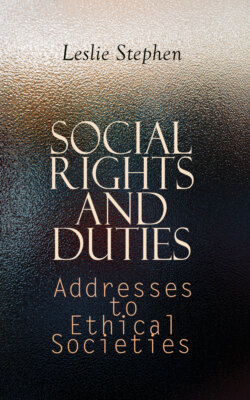Social Rights and Duties: Addresses to Ethical Societies

Реклама. ООО «ЛитРес», ИНН: 7719571260.
Оглавление
Leslie Stephen. Social Rights and Duties: Addresses to Ethical Societies
Social Rights and Duties: Addresses to Ethical Societies
Table of Contents
VOLUME 1
Table of Contents
NOTE
THE AIMS OF ETHICAL SOCIETIES.1
SCIENCE AND POLITICS.2
THE SPHERE OF POLITICAL ECONOMY
THE MORALITY OF COMPETITION
SOCIAL EQUALITY
ETHICS AND THE STRUGGLE FOR EXISTENCE
VOLUME 2
Table of Contents
HEREDITY
PUNISHMENT
LUXURY
THE DUTIES OF AUTHORS
THE VANITY OF PHILOSOPHISING
FORGOTTEN BENEFACTORS
FOOTNOTE:
Отрывок из книги
Leslie Stephen
Complete Edition (Vol. 1&2)
.....
If this be at all true, it may indicate what I take to be the aim of our society, or rather of us as members of an ethical society. We hold, that is, that the great problems of to-day have their root, so to speak, in an ethical soil. They will be decided one way or other by the view which we take of ethical questions. The questions, for example, of what is meant by social justice, what is the justification of private property, or the limits of personal liberty, all lead us ultimately to ethical foundations. The same is, of course, true of many other problems. The demand for political rights of women is discussed, rightly no doubt, upon grounds of justice, and takes us to some knotty points. Does justice imply the equality of the sexes; and, if so, in what sense of "equality"? And, beyond this, we come to the question, What would be the bearing of our principles upon the institution of marriage, and upon the family bond? No question can be more important, or more vitally connected with Ethics. We, at any rate, can no longer answer such problems by any traditional dogmatism. They—and many other questions which I need not specify—have been asked, and have yet to be answered. They will probably not be answered by a simple yes or no, nor by any isolated solution of a metaphysical puzzle. Undoubtedly, a vast mass of people will insist upon being consulted, and will adopt methods which cannot be regarded as philosophical. Therefore, it is a matter of pressing importance that all people who can think at all should use their own minds, and should do their best to widen and strengthen the influence of the ablest thinkers. The chaotic condition of the average mind is our reason for trying to strengthen the influence, always too feeble, of the genuine thinkers. Much that passes itself off for thought is simply old prejudice in a new dress. Tradition has always this, indeed, to say for itself: that it represents the product of much unconscious reasoning from experience, and that it is at least compatible with such progress as has been hitherto achieved. Progress has in future to take place in the daylight, and under the stress of keen discussion from every possible point of view. It would be rash indeed to assume that we can hope to see the substitution of purely rational and scientific methods for the old haphazard and tentative blundering into slightly better things. It is possible enough that the creed of the future may, after all, be a compromise, admitting some elements of higher truth, but attracting the popular mind by concessions to superstition and ignorance. We can hardly hope to get rid of the rooted errors which have so astonishing a vitality. But we should desire, and, so far as in us lies, endeavour to secure the presence of the largest possible element of genuine and reasoned conviction in the faith of our own and the rising generation.
I have not sought to say anything new. I have only endeavoured to define the general position which we, as I imagine, have agreed to accept. We hold in common that the old dogmas are no longer tenable, though we are very far from being agreed as to what should replace them. We have each, I dare say, our own theory; we agree that our theories, whatever they may be, are in need of strict examination, of verification, it may be, but it may be also of modification or rejection. We hope that such societies as this may in the first place serve as centres for encouraging and popularising the full and free discussion of the great questions. We wish that people who have reached a certain stage of cultivation should be made aware of the course which is being taken by those who may rightly claim to be in the van. We often wish to know, as well as we can, what is the direction of the deeper currents of thought; what genuine results, for example, have been obtained by historical criticism, especially as applied to the religious history of the world; we want to know what are the real points now at issue in the world of science; the true bearing of the theories of evolution, and so forth, which are known by name far beyond the circle in which their logical reasoning is really appreciated; we want to know, again, what are the problems which really interest modern metaphysicians or psychologists; in what directions there seems to be a real promise of future achievement, and in what directions it seems to be proved by experience that any further expansion of intellectual energy is certain to result only in the discovery of mares' nests.
.....